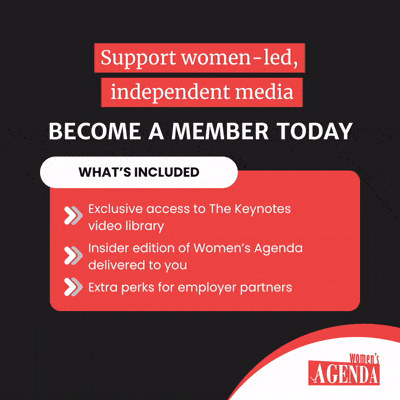At Thursday’s Chief Executive Women event, Macquarie Group chief executive Shemara Wikramanayake spoke about how she no longer sees herself as a “female CEO with brown skin”.
Rather, she’s sees herself as leader who is one of todays’ custodians of a business built over 50 years. As someone, who as part of a team, is delivering innovative solutions and strong outcomes.
In her keynote address, Wikramanayake shared more on how she’s built confidence, something she believes goes back to her childhood, where facing financial hardship and living in different countries fostered a “natural resilience”.
“In our five years in England, we faced financial hardship, so moved homes a few times. I changed schools three times, changed friends and changed continents,” she said. “This could have been unsettling for a child, but I looked on it as an opportunity”.
“Possibly from natural resilience, I was able to accept quickly that I could do nothing about our peripatetic circumstances. But I appreciated that I still had choices and things I could control, including my attitude.
“Being curious and social, I resolved to embrace the frequent changes as an opportunity to learn from different cultures and perspectives.
“If anyone had told me as a child that I couldn’t fulfil my various childhood ambitions to be an astronaut, or pilot or James Bond due to my gender or ethnicity, I would have dismissed their views as irrational. This was my form of resilience.”
Wikramanayake’s childhood experiences helped prepare her for life in the finance sector, where she’s never been part of a majority. In her speech, she shared a story from her early days at Macquarie, where a senior client didn’t have confidence in her ability to do her job.
“I encountered a senior client who didn’t have confidence that a very young looking, brown skinned female would be able to get the job done in what was an important moment in the company’s journey,” Wikramanayake said.
“I could have been demotivated or lost confidence from this. I was instead focused on my responsibility to help deliver the necessary outcome for this client.”
“After the deal concluded successfully, he took me aside and thanked me for teaching him about irrational prejudice and was happy to have me lead further transactions for his company.”
Wikramanayake spent ten years as the Head of Macquarie Asset Management before being appointed CEO two years ago. She was recently ranked fifth on Fortune’s list of the most powerful international women.
In 2018, she was appointed a Commissioner of the Global Commission on Adaption, an initiative led by the World Bank that seeks to accelerate climate action and adaptation planning. Last year, she was appointed to the Climate Finance Leadership Initiative, which is working towards a six-fold increase in climate mitigation from the private sector.
In her address, Wikramanayake said she was concerned that only 35 per cent of people who apply for jobs at Macquarie are women, and noted that structural issues like unaffordable childcare and discrimination need to change in order to bring more women into the finance sector.
She says she’s looking to make change for women by increasing flexible work arrangements at Macquarie in line with what’s changed during the pandemic, and is looking at ways to ease the cost of childcare.
Shemara Wikramanayaketalks about crisis born innovation. An opportunity to learn and build back more diverse and inclusive. @CEWAus #CEWResilience #cewevent
— Pip Marlow (@pipms) November 26, 2020
“We need the richest possible combination of different ages, genders, cultural and racial backgrounds, diversity of sexual orientation and socio-economic backgrounds and experiences – and regardless of any disability,” she said.
“We need the richest possible combination of different ages, genders, cultural and racial backgrounds, diversity of sexual orientation and socio-economic backgrounds and experiences – and regardless of any disability.” Shemara Wikramanayake @Macquarie CEO
— ChiefExecutiveWomen (@CEWAus) November 26, 2020
“This allows us to challenge each other’s perspectives in forming better collective decisions, improves understanding of regional and sectoral nuances and gives us greater empathy in serving a much broader client and community base. It also makes for a much more interesting workplace.”
“Working to ensure diversity of thought and capability is critical. We’ve seen many times a diverse team delivers stronger results than any individual or homogenous team,” she said.
“My main message to girls out there is – is why let boys have all this fun?”


